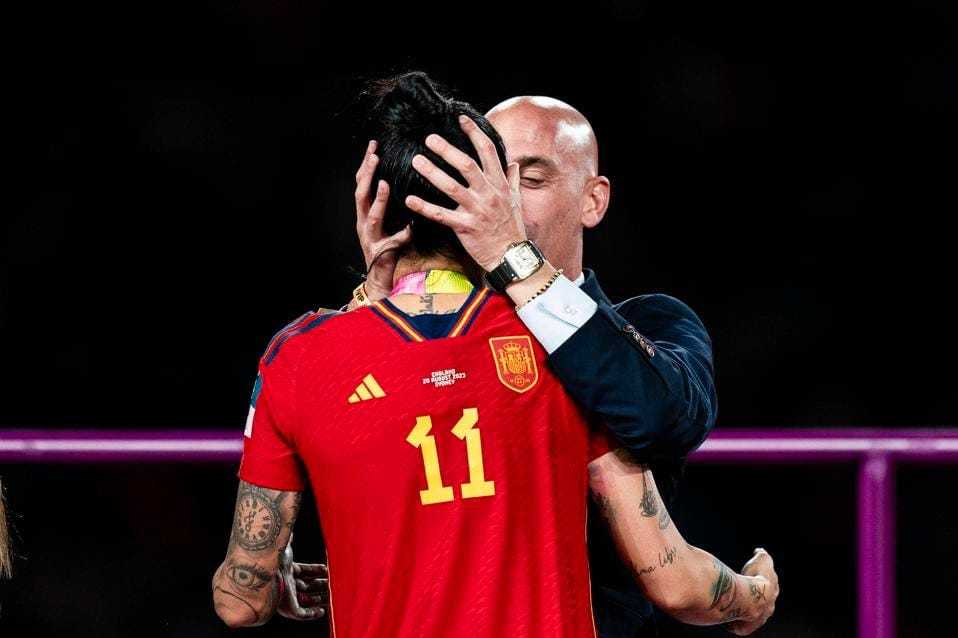The most talked-about moment in women’s soccer last year, and indeed for the past several years, wasn’t a goal, nor a piece of skill, nor anything that happened during a match. It was an unwanted kiss given by a then-federation president to one of the game’s biggest stars.
For many onlookers, the incident between Luis Rubiales and Jennifer Hermoso at the 2023 Women’s World Cup final offered momentary insight into the life of a women’s soccer player. But for those more intimately acquainted with the turmoil and controversy underlying Spanish soccer, it served as a flashpoint.
Among those who instantly saw the bigger picture was Joanna Pardo, the director of the new Netflix documentary, “It’s All Over: The Kiss That Changed Spanish Soccer,” released at the start of the month.
Despite watching the team win a first Women’s World Cup title over England, Pardo was acutely aware that this was a team in crisis, a group of players who had long been rallying against perceived sexism and inequality. The fallout to the Rubiales kiss only reinforced her view that this was a story that demanded a wider audience, and now was the time to tell it.
“The soccer players, for the first time, felt the social support to dare to speak, and we knew the subject in depth,” Pardo told CNN Sport, adding how Rubiales’ now infamous actions after the kiss compelled her to shoot the documentary.
“(He) laid it out for us on a silver platter,” she said.
Rubiales was serving as president of the Royal Spanish Football Federation (RFEF) when he kissed Hermoso during the Women’s World Cup final medal ceremony. He later described the kiss as mutual, but Hermoso has denied that claim, saying that she was not respected.
In the days that followed, Rubiales staunchly defended his actions, refusing to resign from his post while decrying “fake feminism” and an “unjust” campaign against him.
The Spanish women’s national team celebrates winning the Women’s World Cup in 2023. Catherine Ivill/Getty Images
But as pressure grew and with global governing body FIFA handing him a goprovisional suspension, Rubiales resigned from his position in September last year, explaining how “the powers that be will prevent my return.”
FIFA has since banned Rubiales from “all football-related activities,” a decision that was upheld on appeal, while Spanish prosecutors are seeking a two-and-a-half-year prison term for the 47-year-old, alleging that he kissed Hermoso “without consent and acceptance.” Rubiales has denied the charges.
Rifts had appeared in the team long before Rubiales’ kiss. In September 2022, 15 players, who became known as Las 15 (“The 15” in Spanish), announced that they would not undertake international duty while then-manager Jorge Vilda, a long-term ally of Rubiales, remained in charge. Vilda called the situation a “worldwide embarrassment” and some of the players subsequently returned to the team for the World Cup the following year.
The deep-rooted problems in Spanish soccer, which triggered outrage in the Iberian nation and around the world after Rubiales’ kiss, is carefully dissected in the “It’s All Over” documentary, with comprehensive testimonies from some of the nation’s top women’s players, including Alexia Putellas, Aitana Bonmatí – both two-time Ballon d’Or Féminin winners – Irene Paredes and Hermoso herself.
It pays particular attention to how the World Cup-winning players formed a united front amid the fallout from the Rubiales kiss, once again refusing to represent the national team and calling for “real structural changes” within the federation, leading to a crisis which forced the government to intervene.









Leave a Reply